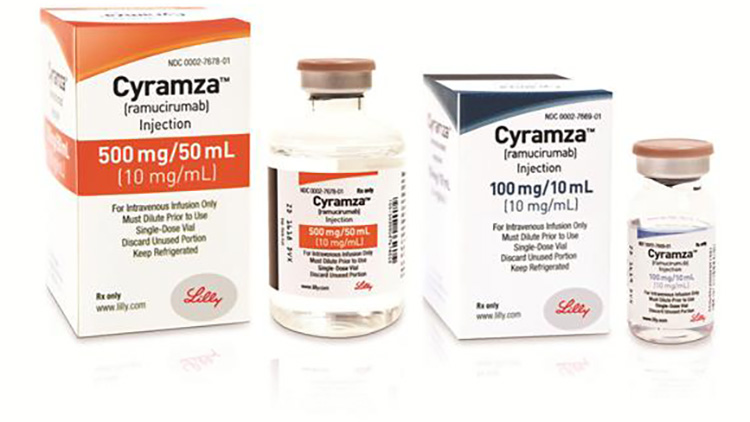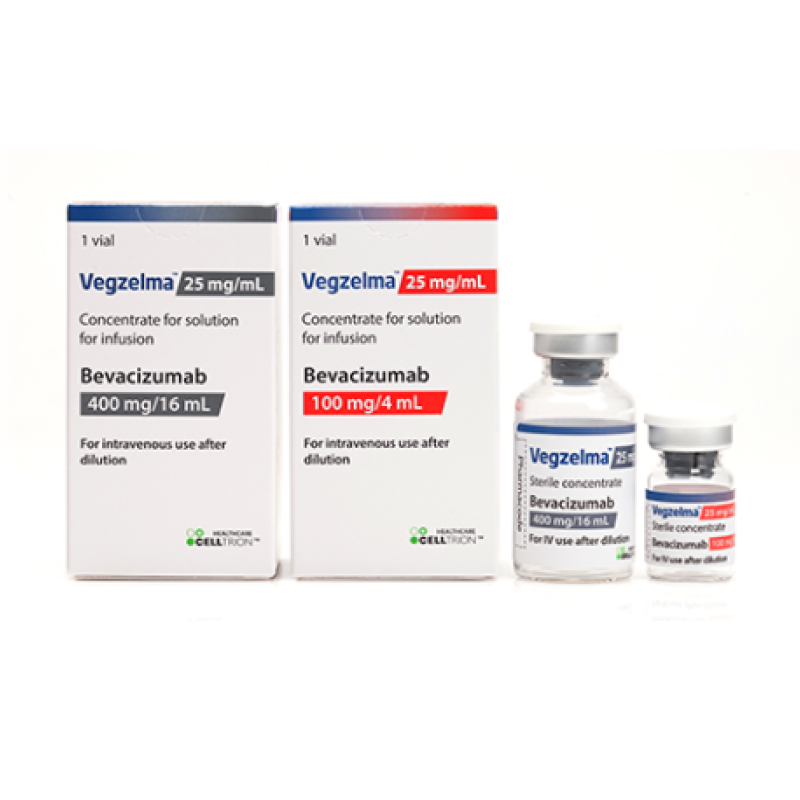Cyramza (ramucirumab) vs Vegzelma (bevacizumab-adcd)
Cyramza (ramucirumab) vs Vegzelma (bevacizumab-adcd)
Cyramza (ramucirumab) and Vegzelma (bevacizumab-adcd) are both monoclonal antibodies that target vascular endothelial growth factor (VEGF) pathways, which are critical for tumor angiogenesis. Cyramza specifically binds to the VEGF receptor 2 and blocks its activation, while Vegzelma, a biosimilar to the original bevacizumab, binds to the VEGF ligand, preventing it from activating its receptors. The choice between these two medications would depend on the specific cancer type, the patient's medical history, and the approval status of the drug for the condition being treated, as well as other individual considerations such as side effect profiles and cost, which should be discussed with a healthcare provider.
Difference between Cyramza and Vegzelma
| Metric | Cyramza (ramucirumab) | Vegzelma (bevacizumab-adcd) |
|---|---|---|
| Generic name | ramucirumab | bevacizumab-adcd |
| Indications | Gastric cancer, non-small cell lung cancer, colorectal cancer, hepatocellular carcinoma | Metastatic colorectal cancer, non-squamous non-small cell lung cancer, glioblastoma, metastatic renal cell carcinoma, cervical cancer |
| Mechanism of action | Angiogenesis inhibitor; VEGFR-2 antagonist | Angiogenesis inhibitor; VEGF-A antagonist |
| Brand names | Cyramza | Vegzelma |
| Administrative route | Intravenous infusion | Intravenous infusion |
| Side effects | Hypertension, diarrhea, headache, hyponatremia | Hypertension, proteinuria, headache, hemorrhage |
| Contraindications | Hypersensitivity to ramucirumab or any component of the formulation | Hypersensitivity to bevacizumab, bevacizumab-adcd, or to any of its excipients |
| Drug class | Monoclonal antibody | Monoclonal antibody |
| Manufacturer | Eli Lilly and Company | Celltrion Healthcare |
Efficacy
Cyramza (Ramucirumab) Efficacy in Lung Cancer
Cyramza (ramucirumab) is a monoclonal antibody that targets the vascular endothelial growth factor receptor 2 (VEGFR2), which is implicated in the angiogenesis process that tumors utilize to grow and spread. In the context of lung cancer, specifically non-small cell lung cancer (NSCLC), ramucirumab has been evaluated for its efficacy. The pivotal trial for ramucirumab's approval in NSCLC was the REVEL study, a phase III clinical trial that demonstrated a statistically significant improvement in overall survival when ramucirumab was added to docetaxel chemotherapy compared to docetaxel alone in patients with stage IV NSCLC who had progressed on or after platinum-based chemotherapy. The improvement in progression-free survival was also observed, indicating that ramucirumab can be an effective second-line treatment for advanced NSCLC.
Vegzelma (Bevacizumab-adcd) Efficacy in Lung Cancer
Vegzelma (bevacizumab-adcd) is a biosimilar to the original bevacizumab, a monoclonal antibody that inhibits vascular endothelial growth factor A (VEGF-A). Bevacizumab has been widely used in the treatment of various cancers, including NSCLC. The efficacy of bevacizumab in lung cancer was established through several clinical trials, including the pivotal ECOG 4599 study, which showed that adding bevacizumab to carboplatin and paclitaxel chemotherapy significantly improved survival in patients with non-squamous NSCLC. As a biosimilar, Vegzelma is designed to have no clinically meaningful differences in terms of safety, purity, and potency when compared to the reference product, bevacizumab. Thus, Vegzelma is expected to be similarly effective in the treatment of NSCLC when used in combination with chemotherapy.
Comparative Efficacy in Lung Cancer
While both Cyramza and Vegzelma target the angiogenesis pathway, their mechanisms of action differ slightly, with Cyramza inhibiting the receptor VEGFR2 and Vegzelma inhibiting the ligand VEGF-A. Direct comparative efficacy trials between Cyramza and Vegzelma specifically for lung cancer have not been conducted, as of the last data available. Therefore, the choice between these two agents may depend on individual patient characteristics, previous treatments, and the specific setting in which the drug is used. Both have shown benefits in terms of survival outcomes in NSCLC when used in combination with chemotherapy, but their use may be guided by different clinical trial evidence, safety profiles, and regulatory approvals for specific indications within lung cancer treatment.
Conclusion
In conclusion, both Cyramza and Vegzelma have demonstrated efficacy in the treatment of NSCLC, improving survival outcomes when used in combination with chemotherapy. Cyramza has shown benefit as a second-line treatment in advanced NSCLC, while Vegzelma, as a biosimilar to bevacizumab, is expected to replicate the efficacy of the original bevacizumab in non-squamous NSCLC. The choice of therapy should be individualized based on a thorough evaluation of the patient's clinical status and the available clinical evidence. Ongoing research may provide further insights into the optimal use of these agents in lung cancer therapy.
Regulatory Agency Approvals
Cyramza
-
European Medical Agency (EMA), European Union

-
Food and Drug Administration (FDA), USA

-
Health Canada

-
Therapeutic Goods Administration (TGA), Australia

-
Medsafe (NZ)

Vegzelma
-
European Medical Agency (EMA), European Union

-
Food and Drug Administration (FDA), USA

Access Cyramza or Vegzelma today
If Cyramza or Vegzelma are not approved or available in your country (e.g. due to supply issues), you can access them via Everyone.org.
How it works

Make an enquiry
Choose the medicine you want to buy, answer a couple of questions, and upload your prescription to speed things up. We’ll get back to you within 24 hours.


Make an enquiry
Choose the medicine you want to buy, answer a couple of questions, and upload your prescription to speed things up. We’ll get back to you within 24 hours.


Breeze through the paperwork
We'll guide you through the required documents for importing unapproved medicine, ensuring you have all the necessary information.


Get a personalized quote
We’ll prepare a quote for you, including medicine costs and any shipping, administrative, or import fees that may apply.


Receive your medicine
Accept the quote and we’ll handle the rest - sourcing and safely delivering your medicine.

Some text on this page has been automatically generated. Speak to your physician before you start a new treatment or medication.
Let's talk
If you have any questions, call us or send us a message through WhatsApp or email:
Contact us




